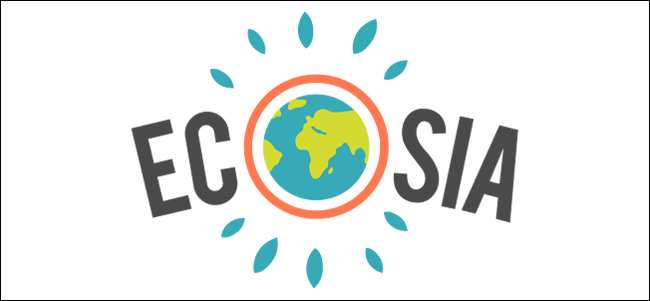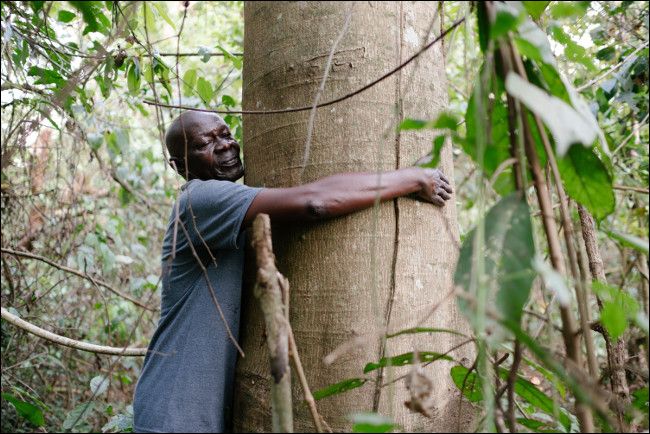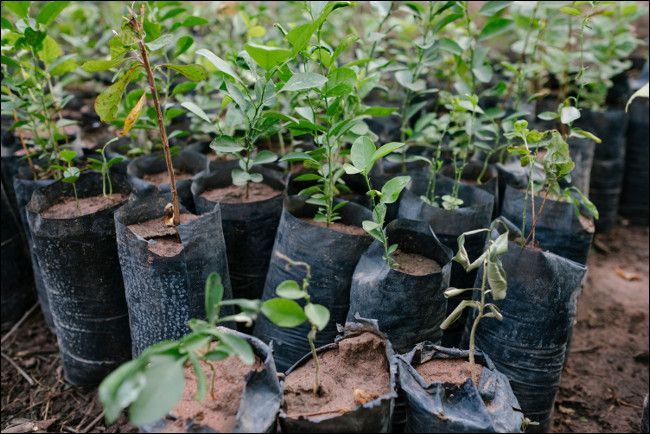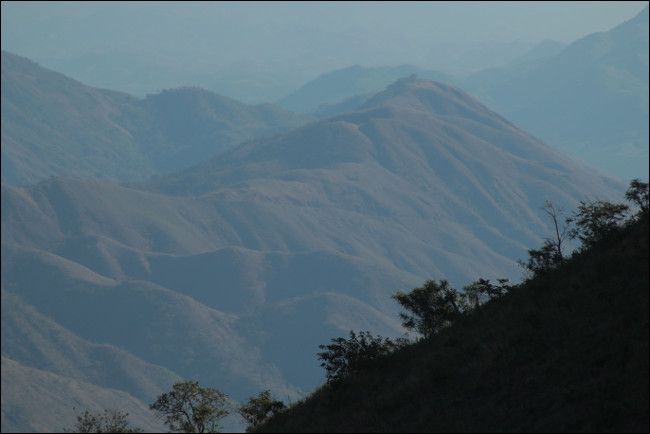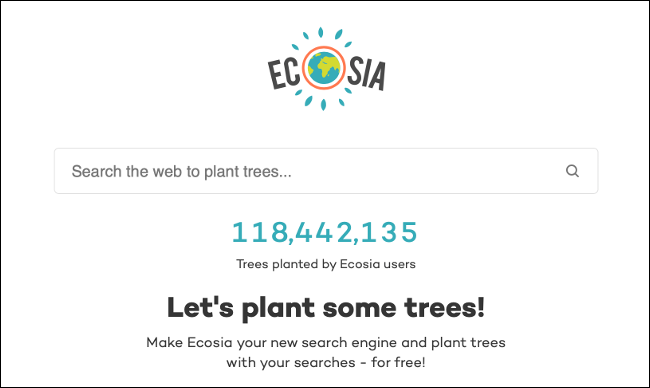Quick Links
Ecosia is a not-for-profit search engine that uses advertising revenue gained from searches to plant trees. It doesn't have the privacy-focus of DuckDuckGo, nor does it have the search results of Google. But it does have a unique mission.
This search engine is getting bigger and more widely recognized. For example, starting with Apple's iOS 14 and iPadOS 14, Ecosia is one of the few options you can use as your default search engine in Safari. Google Chrome also includes it as a built-in option.
Ecosia's Main Mission Is to Plant Trees
Ecosia is a not-for-profit search engine that aims to help the environment by planting trees. The search engine's mission is to absorb as much CO2 as possible by planting trees to try and reduce the impact of climate change. This is done for the planet, for people, and for animals.
The service acknowledges that trees can help empower and lift vulnerable populations out of poverty through the regeneration of depleted soils and agroforestry food-growing programs. The search engine is also concerned with the plight of animals around the world that are losing their habitats to deforestation.
Ecosia is currently committed to 20 tree-planting projects in 15 countries all around the world, from South American countries like Peru and Brazil to Madagascar and Ethiopia in Africa, and other countries, including Spain and Indonesia.
These efforts are focused mostly on biodiversity hotspots, which only make up around 2.3% of the earth's surface, but nevertheless account for half of all unique plant species and over 40% of birds, mammals, reptiles, and amphibians. Trees are also planted in some of the poorest agricultural regions in the world to help restore soil, increase biodiversity, and provide alternatives to monoculture crops.
Ecosia is transparent about its revenue and tree-planting activities. The search engine regularly posts financial reports on its blog to disclose total monthly revenue and identify what percentage was used to plant trees. In November of 2020, the search engine generated over €1.8 million ($2.2 million) and financed over 650,000 trees.
To break down the spending, Ecosia spent 40% of its revenue from this period on trees, with a further 10% going to green investments like solar plants and regenerative agriculture. A total of 47% of revenue was used on taxes and operational costs, while 3% was used for advertising purposes.
Converting Advertisements Into Trees
Ecosia makes money like most other search engines: through advertisements. Just like DuckDuckGo, affiliate ads that are displayed alongside search results enable the search engine to turn a profit. This profit is then used to fund the planting of trees.
According to Ecosia, it takes about 45 searches to fund the planting of one new tree. This number could be reduced dramatically depending on other factors, like whether you click on an advert and how "valuable" the search term is in terms of advertisement payout.
The search engine also has an affiliate program with HotelsCombined called Ecosia Travel. Including the word "hotel" in your searches reveals a new search box at the top of results through which you can book accommodation. When you do this, Ecosia claims to plant around 25 trees, depending on the value of your booking.
Ecosia also has the Ecosia Shop, which sells merchandise like T-shirts, hoodies, and bags. T-shirts are designed to be sent back, recycled, and reworked into new products after being used, further demonstrating Ecosia's commitment to sustainability.
More Privacy-Conscious Than Google
Search engines like Google have a poor track record when it comes to privacy, storing your search history in a profile that is used to serve you more relevant advertisements.
As a result, many have ditched Google in favor of privacy-conscious search engines like DuckDuckGo. While Ecosia is arguably also a privacy-respecting search engine in some ways, its primary mission is to plant trees. In comparison, DuckDuckGo is entirely focused on privacy in all aspects of its operation.
Ecosia states that it "will never share your searches with anyone except services that are directly involved in answering your search request, like Bing." Ecosia is powered by the Yahoo! and Bing search algorithms. DuckDuckGo also uses Bing for its searches, but explicitly states that this information isn't collected or passed on in the first place.
For the service to function, some information must be passed to Bing. According to Ecosia, this includes your "IP address (obfuscated), user agent string, search term, and some settings like your country and language setting." By default, Ecosia sets a Bing-specific identifier to "improve" search results, a feature that is disabled if your browser has the "Do Not Track" flag enabled.
This behavior isn't quite as private as DuckDuckGo, which, according to its privacy policy, doesn't collect or store any information. DuckDuckGo doesn't even store an obfuscated IP address or your user agent string. DuckDuckGo also uses no trackers whatsoever---not even its own internal trackers.
Ecosia promises not to allow third-party trackers on their searches. This means that advertisers cannot track and link your Ecosia search activity to an existing profile. We tested this using both Safari and DuckDuckGo's iPhone app and found no third-party trackers. Both browsers had "Do Not Track" enabled, which suggests that the search engine does respect this setting.
For your search data, Ecosia promises not to store personal profiles of search habits. Ecosia claims that all searches are anonymized within a week of having made them, and says that there are no agreements in place to sell this search data to third-party companies. Your searches also use HTTPS encryption by default, which has become the standard even on Google and Bing.
So What's It Like to Use?
Ecosia works like any search engine that's powered by the Yahoo! and Bing algorithm, including DuckDuckGo. While the results often aren't quite as numerous or relevant as Google's, they're usually good enough to get you where you want to go. While DuckDuckGo uses Bing for most of its results, it also gets additional results from other search engines, whereas Ecosia does not.
Whether you get "better" results from DuckDuckGo, as a result, is up for debate. It likely depends on what you're searching for.
Like Google, Ecosia allows you to filter your results by media, including images and videos. You can click the News filter to see only recent articles. The Maps filter allows you to choose from Google Maps and Bing Maps, sending you off-site for directions and local search results. For comparison, DuckDuckGo built its own mapping solution using Apple's MapKit API due to its tight privacy policy that doesn't require the disclosure of the end user's personal information.
DuckDuckGo has a popular feature called "Bangs," which allows you to search other websites right from the DuckDuckGo search field. Ecosia has search tags that work in the same way, allowing you to add tags like #videos to search videos, #gimages to search Google Images, or #wolfram to search Wolfram Alpha. See the full list of search tags here.
On Ecosia, there's support for rudimentary unit conversions ("2 oz in g") and sums ("2+2"), but no support for currency conversion. You can translate words fairly easily ("hello in japanese"), but it's no Google Translate. At any point, you can click on "Filters" to filter results by time or click "Settings" to change region and safe search settings.
How you'll get on with Ecosia depends on how you use a search engine and how willing you are to sacrifice features to contribute to a sustainability project. Or to look at it another way: If Ecosia is fine for 90% of your searches, are you willing to go out of your way and visit Google or Bing for the other 10%?
Switching to Ecosia
Ecosia, like DuckDuckGo, has already found its way into some of the most popular browsers on the web. This includes Google Chrome and Safari for iOS 14. Other browsers that include an option to search with Ecosia include Adblock Browser, Maxthon, and Brave.
Google Chrome
To search with Ecosia by default, launch Google Chrome and click on the "three dots" ellipsis icon in the top-right corner of the window. Choose Settings, then click on "Search engine" in the menu on the left.
Now, click on the drop-down box under "Search engine" and choose Ecosia.
Safari on iPhone and iPad
On iPhone or iPad, launch the Settings app and navigate to Safari > Search Engine. Pick Ecosia from the list to set it as your default search engine.
(If you don't see Ecosia in the list, make sure you're running iOS 14 or later by updating your iPhone or iPad.)
Other Browsers
Most other major browsers are supported through an Ecosia add-on. Try visiting Ecosia.org in your browser of choice and look for the blue bar that says "Add Ecosia to (Browser)" and click on it.
There are also Ecosia add-ons for Safari (Mac), Firefox, and Edge.
Also Consider DuckDuckGo
Ecosia provides a real alternative to Google with an environmentally friendly twist.
If you like the idea of ditching Google, but you demand a bit more functionality and a strong emphasis on privacy, consider switching to DuckDuckGo.

